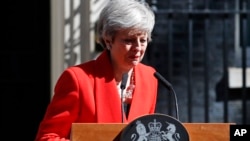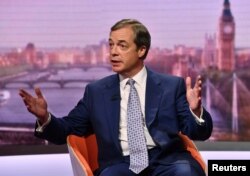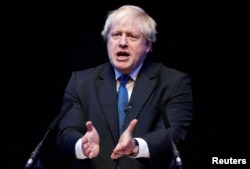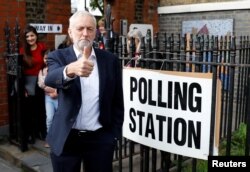Theresa May became the third Conservative leader to fall victim to party divisions over Britain's relationship with the European Union, following in the footsteps of Margaret Thatcher and David Cameron.
Facing a party revolt and threats of mass cabinet resignations, May on Friday announced her departure, but will remain as Prime Minister while the Conservatives elect a new leader, and will stay as head of government for U.S. President Donald Trump's state visit to Britain next month.
Her exit, though, is unlikely to clarify how and when, and under what terms, Britain will leave the European Union, say party insiders and analysts.
Her successor will face exactly the same conundrum that thwarted May — bridging the division between those who want to remain in the EU and those who want out.
The irreconcilable division within the Conservative parliamentary party over Brexit reflects the split down the middle in the country at large. And with parliament hung, factions undermining party discipline, and no party commanding an overall majority in the House of Commons, the challenge to find a way out, nearly three years after Britons voted by a slim majority for Brexit, becomes thornier by the day.
"The scope for compromise has drastically narrowed," warned The Economist magazine Friday.
Brexiters increasingly want a stark, sharp and total break with the EU and are dismissive of even negotiating a trade deal with Brussels; while their opponents now hope to reverse the 2016 referendum and shape the circumstances for a second plebiscite, which they hope will lead to Britain remaining a member of the bloc.
How Britain escapes the trap remains unclear and is unlikely to be helped by the results of the European parliamentary elections due to be announced Sunday. The newly formed Brexit Party of Nigel Farage will likely top the poll, but smaller pro-Remain parties will also likely do well — reflecting the overall confounding split in the country.
Those results may well pull the two main establishment parties — the Conservatives and Labour — further to the extremes in the Brexit debate, polarizing Britain even more and making it harder for May's successor to navigate a way out of the mess.
The drift is depressing the value of the pound, deterring foreign investment and prompting despair among business executives, who are unable to make any firm plans.
Possible successors
Boris Johnson, the colorful former foreign minister, is the leading contender to succeed May. An opinion poll published Friday in The Times suggested Johnson is the favorite among Conservative activists to be the next leader. But he's unpopular among party lawmakers, who disdain his opportunism and showmanship and doubt he has the discipline and consistency to helm a government and put in the everyday work needed.
Conservative lawmakers initially pick via a series of knockout votes two candidates to present to the broader party membership, which makes the final decision. "The race really is Boris's to lose," according to Fraser Nelson, editor of the Spectator magazine.
Other candidates include the current foreign minister, Jeremy Hunt, the interior minister, Sajid Javid, and hardline Brexiters Dominic Rabb and Andrea Leadsom, whose resignation midweek as a minister triggered the chain of events for May's decision to quit. Another possible dark horse is Michael Gove, the environment minister.
The election process will take nearly two months to conclude.
'Fight to the death'
The political struggle ahead both within the ruling Conservatives and across the country is likely to be even more brutal than the last two years. "Brexit will become a fight to the death," predicted commentator Philip Collins. "All along, there have only been three options: to leave without a deal, to leave with a deal and to remain via a second referendum. The country, though, has been held to ransom by purists."
He added: "Brexit will become a straight contest between one group of extremists who kid themselves that leaving the EU without an agreement is worth the collateral damage, and another group of extremists who put their fingers in their ears so they cannot hear the banal truth that thwarting the 2016 referendum result comes at a severe political cost."
The political damage is mounting. Both of Britain's main two parties are cracking under the strain and face existential threats, the Conservatives most obviously. The Brexit Party is splitting the right-wing vote.
Pollsters say that Farage's new party, if it continues to surge, could take between 60 to 113 seats off the Conservatives in a general election. That would deny the Conservatives any chance to form a new government, if an election is called in the next few months, a high likelihood. Labour, too, under the leadership of the far-left Jeremy Corbyn is seeing voters defect to the Liberal Democrats and small parties.
The continuing political uncertainty in London, with more disarray likely in the coming months, is exasperating EU leaders and the national leaders of the 27 other member states. Johnson has said if elected leader, he will seek to renegotiate May's contentious Brexit deal, itself the result of nearly two years of ill-tempered haggling with Brussels.
But EU leaders have made it clear they're unprepared to restart talks on the deal.
Reaction in Europe
European leaders reacting to May’s announcement expressed worry that a no-deal Brexit might now be more likely. Ireland’s prime minister, Leo Varakar, said: "Obviously, as anyone can see, British politics is consumed by Brexit and will be consumed by Brexit for a very long time. It now means we enter a new phase when it comes to Brexit and a phase that may be a very dangerous one for Ireland.”
Spain's caretaker government said May's resignation is bad news for those hoping for an orderly British exit from the EU. “A hard Brexit is a reality that under the current circumstances is almost impossible to avoid,” said spokeswoman Isabel Celaá.
France’s Emmanuel Macron said it would likely prolong an impasse.








